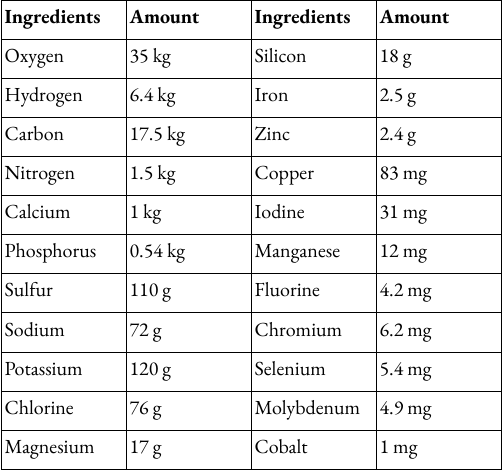Exploring the Essence of Humanity: What It Means to Be Human
Written on
What does it truly signify to be human? This question resonates deeply, and here’s my perspective on it.

As a child, I was captivated by the series Fullmetal Alchemist, which continues to intrigue me. The narrative follows brothers Edward and Alphonse Elric, both skilled alchemists who delve into the complex art of matter transformation.
The story begins with their quest to bring their deceased mother back to life, a venture that necessitates the creation of a human vessel. They meticulously gather the required components for this alchemical task.
The concoction they devise includes:
- Water (35 L)
- Carbon (20 kg)
- Ammonia (4 L)
- Lime (1.5 kg)
- Phosphorus (800 g)
- Salt (250 g)
- Saltpeter (100 g)
- Sulfur (80 g)
- Fluorine (7.5 g)
- Iron (5 g)
- Silicon (3 g)
- Fifteen additional trace elements.
However, their attempt falters, mirroring the myth of Icarus, as they overreach in their ambition. It seems that the creation of life is inherently divine, and their failure brings consequences.
Ultimately, the brothers face a dire predicament, setting off on a harrowing adventure. But this is fiction. What about reality?
How to Create a Human
In our world, science communicator Kyle Hill applied Stoichiometry to derive a more precise formula for constructing a human being.

Calculating the total weight of these ingredients yields approximately 62 kg, aligning with the average adult human's weight. Thus, Hill’s formulation is arguably more credible than that of the Elric brothers.
Yet, even with the proper ingredients and mixing, is it truly possible to create a human being?
Probably not. I sense your skepticism. If it were straightforward, someone would have achieved it by now. The Gestalt principle reminds us that "the whole is greater than the sum of its parts." A human is more than just a collection of materials; it is a singular entity.
Carl Sagan once articulated:
> “The beauty of a living thing is not the atoms that go into it, but the way those atoms are put together.”
Consider this: if we somehow succeeded in crafting an ideal human body, would we even label it as human?
Perhaps not. Despite its outward appearance as Homo sapiens, we might only categorize it as a homunculus.
Imagine if it not only resembled a human but also exhibited human-like thoughts, speech, and emotions. What if it could feel love, hate, kindness, and cruelty? At what point do we determine its humanity?
Such inquiries inevitably lead us to reflect on our own nature, compelling us to question the fundamental traits that define us as human—if such traits even exist.
This brings us to the pivotal question: What does it mean to be human?
Are Humans Truly Humane?
Searching for "What does it mean to be human?" on YouTube will yield numerous TED Talks addressing this topic. Most offer a similar conclusion: humanity is characterized by "love," "kindness," and "empathy."
I find this conclusion unsatisfactory. While appealing, it falls short because these qualities are not exclusive to humans. Many sentient beings share these traits, often exhibiting them more profoundly and consistently than we do. For example, wolves display pack loyalty, while rats console their distressed peers.
If we define humanity solely through these attributes, what claim do we have to them? Shouldn't we consider "animality" as a more fitting term?
Moreover, humans are equally capable of malevolence as they are of benevolence. Hatred feels as natural to us as love; cruelty competes with kindness, and indifference often rivals empathy. We are not universally viewed as moral exemplars; we embody both angels and demons.
This raises another thought-provoking issue: the existence of angels and demons is unproven. Perhaps "angelic" and "demonic" are merely descriptors for the opposing extremes of human behavior.
If we assign our best and worst traits to supernatural entities, what remains for us? Are we then left in a state of moral limbo?
Perhaps morality is inherently subjective and fluctuating, complicating the quest for a definitive answer. Let’s shift our focus to wisdom instead.
Homo Sapiens and Beyond
The term "Homo sapiens," meaning "wise human," suggests that our defining trait is wisdom rather than love, kindness, or empathy.
In his renowned work Sapiens: A Brief History of Humankind, historian Yuval Noah Harari delves into this concept to explore humanity's essence. While the book does not present a complete answer, it offers intriguing insights.
Harari identifies three pivotal revolutions in our history:
Cognitive Revolution (70,000 years ago)
This era marked the emergence of complex thought and imagination, leading to the creation of myths, legends, and fantasies. This capacity enabled humans to communicate and collaborate in unprecedented ways, discussing concepts beyond sensory experience. No other species seems capable of this remarkable feat. Perhaps imagination is what truly delineates humanity.
Agricultural Revolution (10,000 years ago)
This revolution heralded the transition from a nomadic lifestyle to settled agricultural societies, allowing humans to accumulate food and dramatically increase their population. Paradoxically, this shift led to more labor, less leisure, and new anxieties about resources and climate. With the rise of distinct cultures, religion, empires, and currency emerged as unifying forces among humanity.
Scientific Revolution (500 years ago)
The advent of objective science initiated profound changes in human understanding and influence. Science acknowledges our ignorance and ignites an insatiable quest for knowledge, challenging us to comprehend and manipulate nature's laws. The trajectory of scientific advancement may soon provoke transformative shifts in our identity, blurring the lines of what it means to be human.
The Three Defining Aspects of Humanity
Imagination, culture, and science—these three elements proposed by Harari resonate with me. I believe they uniquely characterize human beings, as we alone seem capable of imaginative thought, complex cultural formations, and the scientific method to navigate our universe.
However, I must admit that even these attributes feel somewhat incomplete.
Is that genuinely what it means to be human?
Epilogue: My Perspective on Humanity
"Human, what does it mean to be human? Bones, blood, muscle tissue, and 70% fluid. With any luck, you’ll have 5 senses included And opposable thumbs to play beautiful music with." — Brendan “Tuka” Tuckerman, My Star
Thus far, we’ve explored the physical, moral, and intellectual dimensions of humanity. This encompasses body, spirit, and mind. Unless I've overlooked another facet of human existence, this encapsulates our essence.
Through Harari’s insights, we’ve identified imagination, culture, and science as answers. While they may not be wholly satisfying, they are more tangible than abstract ideals like love or kindness, which we share with other species.
Yet, I propose an alternative answer: Art.
To me, art embodies what it means to be human. While I lack concrete evidence, I believe art represents a unique intersection of imagination, culture, and science. It emerges from creativity, shaped by cultural influences, and actualized through scientific principles. Art is akin to magic.
Often dismissed as mere entertainment, art persists through human history. Even amidst turmoil—be it war or pandemic—we seek solace in art, just as we do in food and shelter.
Why is this so? Perhaps it’s because our innate desire is to pursue beauty. This aspiration infuses our actions with meaning, and art serves as the most effective vehicle for that pursuit.
Junot Díaz captured this sentiment perfectly:
> “Art has a way of confronting us, of reminding us, of engaging us, in what it means to be human, and what it means to be human is to be flawed, is to be contradictory, is to be often weak, and yet despite all of these what we would consider drawbacks, that we’re also quite beautiful.”
Buddha remarked that life is suffering—an experience devoid of ultimate purpose. Yet, despite our inevitable mortality, we strive for beauty. I see no other beings engaging in this pursuit as we do, which shapes my current understanding of humanity.
As AI continues to advance in art creation, I may soon need a more profound answer to this question.
What does it mean to you to be human?
The Apeiron Blog — Big Questions, Made Simple.
Philosophy can often appear complex. To simplify, we compile the finest articles, news, reading lists, and additional resources to accompany you on your intellectual journey. Follow us on Medium and subscribe to our free mailing list.